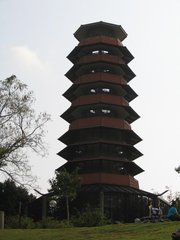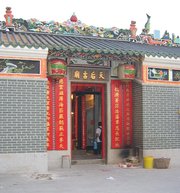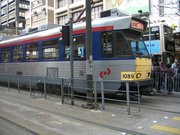Yuen Long
|
|
Yuen Long (元朗, Jyutping: jyun4 long5, pinyin: Yuánlǎng) (used to be known as Un Long), one of the 18 districts of Hong Kong, located in the North-West of the New Territories, is a post-war new town set in the centre of Hong Kong's largest alluvial plain. With an area of 144 km², it covers Ping Shan Heung (屏山鄉), Ha Tsuen Heung (廈村鄉), Kam Tin Heung (錦田鄉), Pat Heung (八鄉), San Tin Heung (新田鄉), Shap Pat Heung (十八鄉), Yuen Long Town (元朗市) and Tin Shui Wai (天水圍).
Like Tai Po, Yuen Long used to be a traditional market town. The total population of Yuen Long is around 534 000. The present population of Yuen Long New town is 211,000 and is expected to grow to around 287,000 upon full development.
| Contents |
Popular Scenic Spots
1. Kat Hing Wai in Kam Tin is one of the District's best-known walled villages. It is the ancestral home of the Tangs, a famous clan in the territory. Built by the family 500 years ago, it is a rectangular walled village with an area of 100 metres X 90 metres. As a family stronghold, Kat Hing Wai has served the Tangs well through the centuries. In the Qing Dynasty, a five-metre high blue brick wall and four cannon towers were added to defend bandits.
Route: West Rail Kam Sheung Road Station or KMB Rt. 54, 64K, 77K
2. Tai Lam Country Park is at the west of New Territory with an area of 54 km². Tai Lam has a small area of porphyry in the NorthEast and for the remaining area, it is composed of highly erodible decomposed granite.In 1952, afforestation started as a measure to protect the water catchment area. In spite of the poor soil conditions and the set-backs of fire damage over the years, mature stands of Acacia confusa, Lophostemon confertus, Pinus massoniana, Pinus elliottii and Eucalyptus species now cover most of the area. In addition, the plantations also offer a good habitat for birds, pangolins, Chinese leopard cat, and barking deer. Nevertheless, Tai Lam is an excellent place for outdoor activities because of its remoteness.
3. Tai Fu Tai, was probably built in 1865 in the reign of the Ching Dynasty. It is a richly embellished residence situated on a spacious ground, with a large open space in front and a garden at the back. The whole compound is surrounded by a green-brick wall. It is a fine example of traditional Chinese dwellings of the scholar-gentry class and is certainly one of the most elegant buildings throughout the territory.
Route: KMB Bus 76K to San Tin
4. Mai Po Marshes is located in the centre of the wetland and has achieved international significance as a stopping and feeding place for migratory birds along the East Asian-Australian Flyway. The birdwatching season runs from October to May and more than 300 type of birds have been recorded in the area, many of them are rarely seen anywhere outside the region
Visitors or Tourists may go to Mai Po in the following ways:
-From Central take Bus no. 968 to Yuen Long (West) Bus terminal, then change taxi.
-From Sheung Shui 上水 railway station take Bus 76K to Mai Po village, then walk to the Marsh (around 20 minutes).
-From Sheung Shui 上水 railway station take Bus 76K or Red mini-bus 17 to Mai Po village, then walk to the Marsh (around 20 minutes).
*NOTE
On 30 Jan 2004, the HK Gov. suspended public visits to the Mai Po wetland reserve as a supposed measure to protect people from avian flu (H5N1).
5. Hong Kong Wetland Park(香港濕地公園) is located at the northern part of Tin Shui Wai. It was intended to be an ecological mitigation area (EMA) for the wetlands lost due to Tin Shui Wai New Town development. In 1998, a project named as International Wetland Park and Visitor Centre Feasibility Study was initiated by the Agriculture, Fisheries and Conservation Department and the Hong Kong Tourism Board with a view to expanding the EMA to a wetland ecotourism attraction. After concluding that it was feasible to develop a Wetland Park at the EMA site without compromising its intended ecological mitigation functions and the development of the Wetland Park will also enhance the ecological function of the EMA to a world-class conservation, education and tourism facility, the concerned parties started the Wetland Park Project, which is regarded as one of the Millennium projects by the Administrations.
6. Shan Pui River (山貝河) became famous since late 2003. This muddy, dirty, narrow river was the water source of the many citizens living in the nearby village. Few months ago, a crocodile was discovered by the citizens living there and soon reporters were attracted to the river to observe it. This premature crocodile was reported as one of the species by the expertise.
Yuen Long Park is a park at Yuen Long Town with recreation facilities. There is a 7-storey pagoda enclosing an aviary.
Route: LRT Shui Pin Wai Station or No. 68M, 968 bus
8. Ping Shan Heritage Trail(屏山文物徑)
Ping Shan Heritage Trail was opened on 12th December 1993. Ping Shan is one of the oldest districts in Hong Kong. On the Ping Shan Heritage Trail, there are many traditional buildings such as 聚星樓, 鄧氏宗祠 and so on. At the entrance, visitors can obtain a booklet which tells the background of each building. Tourists may take photos on the heritage trail and understand more of the history of the area.
Route: LRT Ping Shan Station or West Rail Tin Shui Wai Station
It is sponsored by the South China Agricultural University. Therefore, you can learn a lot from the environment. With the technology support, all the flowers and plants grow very well. People can pick lychees when they are in season.
Route: No. K66 bus or public minibus
Leisure and Cultural Facilities
1. Yuen Long Theatre opened in May 2000. This modern performing arts venue has become a centre for the arts in the Northwest region of the New Territories. The Theatre is situated at Yuen Long Tai Yuk Road in the vicinity of Yuen Long Park, Yuen Long Stadium and the Public Swimming Pool. The bamboo courtyard is a focus within the foyer, which creates an ambience of serenity and tranquility.
Route: Yuen Long Tai Yuk Road near Police Station LRT 'Fung Nin Road' Station or No. 68M, 68X, 968 bus
2. Yuen Long Town Hall Yuen Long Town Hall is located in Kau Yuk Road, near Yuen Long Police Station. It is to organize courses and leisure activities. There is also study room.
Route: LRT Fung Nin Road Station or No. 68M, 68X, 968 bus
3. Yuen Long Swimming Pool It is situated at Tai Yuk Road.There are 5 Standard swimming pools for four seasons.
Route: LRT FUNG Lin Road Station or No. 68M, 68X, 968 bus
4. Tin Shui Wai Swimming Pool It is situation at 1 Tin Pak Road. There are 3 standard swimming pools for four seasons and a children swimming pool in summer.
Route: LRT Tin Wu Station
5. Yuen Long Public Library It is at 1/F of Yuen Long Government Offices, 2 Kiu Lok Square, Yuen Long.
Route: LRT Hong Lok Road or No. 68M, 68X, 968 bus
6. Tin Shui Wai Public Library It is at No. 101-102, 1/F, Kingswood Ginza, Phase 2, 18 Tin Yan Road, Tin Shui Wai.
Route: LRT Tin Wing Station or No. 276A bus
Transportation
Though Yuen Long is located in the North-West part of N.T., it has a well-built traffic network. It is easily accessible from different parts of Hong Kong by bus, mini-bus, railway etc.
-Bus (by Kowloon Motor Bus)
-Light Rail (by Kowloon-Canton Railway Corporation (KCRC))
-West Rail (by Kowloon-Canton Railway Corporation (KCRC), started at December 2003)
-Long Ping and Yuen Long
-Mini-bus
-Taxi
After the operations of Route 3 and Tai Lam Tunnel in mid 1998, the external transport of Yuen Long has already been improved significantly.The travelling time from Yuen Long Town to Hong Kong Island can be shorten to 40 minutes, comparing to around one and a half hour in the past.
Yuen_Long_West_Rail_Station_out.JPG
Yuen_Long_West_Rail_Station_by_siukin.JPG
Culture
Special festivals
- Tin Hau Festival (天后誕巡遊)
The Tin Hau Festival is on the 23rd of March on the lunar calendar. It celebrates the god who protects the lives of the citizens, Tin Hau. On the festival, the villagers in Yuen Long gather together and carry out a parade that consists of various traditional rituals, such as lion dancing that can last up to 3 hours.
Cuisine
- Poon choi (盆菜)
- Sweet heart cake (老婆餅)
Statistical Information
| Demographic characteristics | ||
|---|---|---|
| Population | 449,070 | |
| Proportion of population (%) | Aged under 15 | 20 |
| Aged 15-64 | 71 | |
| Aged 65 and over | 9 | |
| Median age | 33 | |
| Proportion of population aged 15 and over being never married (%) | Male | 32 |
| Female | 27 | |
| Education | ||
| School attendance rate of population aged 6-18 (%) | 92.9 | |
| Proportion of non-student population aged 20 and over having attained tertiary education (%) | 10.9 | |
| Labour force characteristics | ||
| Labour force | 219,444 | |
| Labour force participation rate (%) | Male | 74.0 |
| Female | 48.2 | |
| Both sexes | 60.9 | |
| Median monthly income from main employment of working population (HK$) | 10,588.7 | |
| Household characteristics | ||
| Number of domestic households | 137,211 | |
| Average domestic household size | 3.2 | |
| Median monthly domestic household income (HK$) | 16,763.5 | |
| Housing characteristics | ||
| Number of occupied quarters | 136,705 | |
| Average number of domestic households per unit of quarters | 1.01 | |
| Proportion of domestic households owning the quarters they occupy (%) | 48.15 | |
| Median monthly domestic household mortgage payment and loan repayment (HK$) | 7,693.83 | |
| Median mortage payment and loan repayment to income ratio (%) | 24.63 | |
| Median monthly domestic household rent (HK$) | 2,513.04 | |
| Median rent to income ratio (%) | 16.36 | |
Future
Entering into the Year 2004, development in Yuen Long has been carrying out very rapidly. The West Rail project and other major infra-structural projects have all together changing the face of Yuen Long from an old rural area into a vibrant and dynamic city.
Apart from the West Rail project, the Hong Kong government recently approved the construction of the North-West gateway 西部通道, the fourth cross border route,between Hong Kong and China and the project is expected to complete in 2005. The site chosen in Hong Kong is 鰲磡石, located at the North West of Yuen Long and that in China is 蛇口, the busiest harbour port. The bridge will be of 5.4km long and the expected traffic capacity is 80,000 car per day. It will bring great benefit to residents in Yuen Long as going back to mainland China will only take 15 minutes.
Expressway---Route: Number 10
Connecting Yuen Long to North Lantau Island
- Route: Number 10 (http://www.legco.gov.hk/yr97-98/chinese/panels/plw/papers/pl15012a.htm)
Additional Information
External links
- Yuen Long District Council (http://www.districtcouncils.gov.hk/yl/english/welcome.htm)
- Electoral Boundary Map (http://www.info.gov.hk/eac/pdf/distco/maps/dc2003m.pdf)
- Yuen Long New Town (http://www.cedd.gov.hk/eng/about/achievements/regional/regi_yuenlong.htm)
- Tin Shui Wai New Town (http://www.cedd.gov.hk/eng/about/achievements/regional/regi_tinshuiwai.htm)
- Yuen Long Theatre (http://www.lcsd.gov.hk/CE/CulturalService/Yuenlong)
- Yuen Long Town Hall (http://www.ylth.org.hk/)
- Yuen Long New Town (http://www.info.gov.hk/tdd/towns/yuenlong.htm)
- Hong Kong government pamphlet about the development of the new town (http://www.info.gov.hk/planning/info_serv/publication/nt_pamphlet02/yl_html/index_e.htm)
- Hong Kong Tourism Board (http://www.discoverhongkong.com/eng/touring/hkiidistricts/ta_dist_yuen1.jhtml)
- WWF Hong Kong (http://www.wwf.org.hk/eng/maipo)
- Hong Kong Wetland Park (http://www.afcd.gov.hk/wetlandpark)
- Yuen Long Special (http://www.yl.com.hk/)
(B仔涼粉)]



